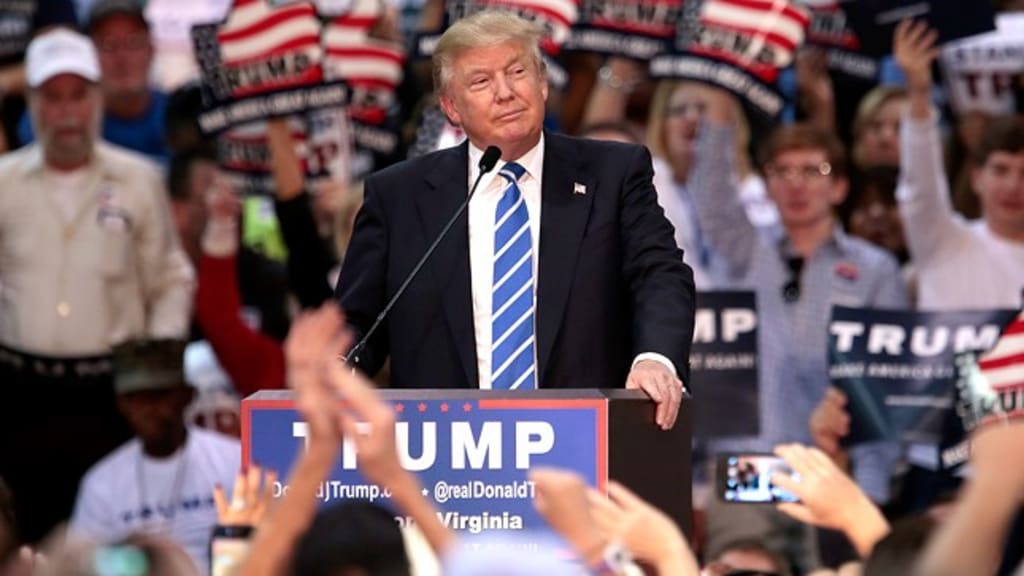2024 American elections in the shadow of Trumpism: anti-thesis of Trumpism
2024 American elections: Trumpism

As an AI language model, I do not possess the ability to predict the future or know the outcome of political events. However, I can provide a general overview of what the US 2024 elections under Trumpism may look like based on current political trends and historical data.
If former President Donald Trump decides to run for president again in 2024 and gains the Republican nomination, the election would likely be highly polarized and contentious. Trump's campaign style is known for being combative and divisive, and his rhetoric often targets marginalized groups and his political opponents.
Under Trumpism, the Republican Party would continue to embrace his "America First" agenda, which prioritizes policies that support US interests over global cooperation. This could lead to increased protectionist measures, such as trade tariffs and immigration restrictions.
In terms of domestic policy, Trumpism would likely emphasize conservative values and prioritize issues such as Second Amendment rights, opposition to abortion, and limiting government regulations. The Trump administration's focus on deregulation and tax cuts for businesses could also be expected to continue.
On the other hand, the Democratic Party would likely focus on issues such as healthcare reform, climate change, and social justice, and present a stark contrast to Trumpism. The 2024 election could be seen as a referendum on the direction of the country, with voters deciding between a continuation of Trump's policies or a shift towards a more progressive agenda.
Ultimately, the outcome of the US 2024 elections under Trumpism would depend on a variety of factors, including the state of the economy, the handling of ongoing issues such as the COVID-19 pandemic, and the effectiveness of each candidate's campaign strategy.
Under a Trumpism administration, foreign policy would likely continue to be focused on American exceptionalism and prioritizing the interests of the United States. The administration would continue to pursue a hardline stance on China and other countries seen as economic or security threats to the US. This could lead to increased tensions between the US and other nations and a more isolationist foreign policy.
One potential scenario is that Trumpism could lead to the fracturing of the Republican Party, with traditional conservatives and moderates rejecting the Trumpist agenda and forming their own political movement. This could split the Republican vote and give an advantage to the Democratic nominee in the election.
However, if the Republican Party remains united under Trumpism, the election could be closely contested. Trump's base of supporters remains strong, and he could potentially win a significant portion of the electoral vote even if he does not win the popular vote.
In the event of a Trump victory in the 2024 election, the country would likely continue to experience political polarization and division. Many progressives and minorities would likely feel disenfranchised and marginalized under a Trumpist administration, and social unrest could potentially increase.
Overall, the US 2024 elections under Trumpism would likely be a highly charged and divisive political event, with significant consequences for the direction of the country. While it is impossible to predict the outcome with certainty, it is clear that the election would have a major impact on US politics and society for years to come.
Under Trumpism, the issue of voter fraud and election integrity would likely continue to be a prominent issue in the 2024 elections. Trump and his supporters have consistently made baseless claims about widespread voter fraud in the 2020 elections, and this rhetoric could potentially discourage voter turnout and undermine confidence in the electoral process.
In addition, Trumpism would likely continue to embrace a confrontational approach towards the media, portraying them as biased and dishonest. This could lead to further erosion of trust in traditional media sources and the rise of alternative, partisan news outlets.
The issue of immigration would also likely remain a key topic in the 2024 elections under Trumpism. The administration would likely continue to push for stricter immigration policies, such as building a border wall and reducing the number of legal immigrants allowed into the country. This could further exacerbate tensions between the US and its neighbors and lead to more humanitarian crises at the border.
Finally, the issue of the Supreme Court would likely remain a key point of contention in the 2024 elections under Trumpism. The Trump administration was successful in appointing three conservative justices to the court, shifting its ideological balance to the right. Democrats and progressives would likely push back against this trend and emphasize the importance of protecting reproductive rights, civil liberties, and other key issues.
Overall, the US 2024 elections under Trumpism would be characterized by a highly polarized and divisive political climate. The outcome of the election would have far-reaching implications for US policy and society, and could potentially lead to further social unrest and political instability.
The anti-thesis of Trumpism would likely prioritize unity, inclusivity, and a return to traditional American values. The Democratic Party and other progressive movements would likely embrace policies that prioritize social justice, equality, and environmental protection.
One key area of focus for the anti-thesis of Trumpism would be restoring faith in democratic institutions and the rule of law. This could involve measures to protect voting rights, increase government transparency, and restore the independence of the judiciary.
In terms of domestic policy, the anti-thesis of Trumpism would likely emphasize progressive values, such as universal healthcare, workers' rights, and income equality. There would also be a renewed focus on addressing climate change and promoting sustainable development.
Foreign policy under the anti-thesis of Trumpism would likely involve a more collaborative approach to global challenges, such as climate change, international security, and human rights. The US would seek to re-engage with international organizations and strengthen diplomatic ties with traditional allies.
Overall, the anti-thesis of Trumpism would be characterized by a commitment to democratic values, inclusivity, and social progress. The movement would seek to address the root causes of political polarization and division, and promote a more unified and equitable society.
The anti-thesis of Trumpism would also prioritize the importance of science, evidence-based policy-making, and expertise. This would involve restoring funding for scientific research and promoting policies that are grounded in evidence and data.
Another key focus of the anti-thesis of Trumpism would be addressing systemic racism and inequality. This could involve policies such as police reform, addressing disparities in healthcare and education, and addressing income inequality.
The anti-thesis of Trumpism would also emphasize the importance of global cooperation and solidarity, particularly in the face of challenges such as pandemics, climate change, and economic inequality. The US would seek to work with other countries and international organizations to address these challenges and promote a more just and sustainable global order.
In terms of political discourse, the anti-thesis of Trumpism would likely prioritize civil discourse and respectful dialogue. The movement would seek to reduce political polarization and promote unity by emphasizing shared values and a common vision for the future.
Overall, the anti-thesis of Trumpism would represent a stark departure from the divisive and isolationist policies of the Trump administration. The movement would prioritize progressive values, collaboration, and evidence-based policy-making, with the goal of building a more just, equitable, and sustainable society.
About the Creator
Can Toptaş
A graduate of international relations and political science, a strategist, a former navy soldier, a liberal, a pluralist, a proponent of social justice, a fashion guru.






Comments
There are no comments for this story
Be the first to respond and start the conversation.